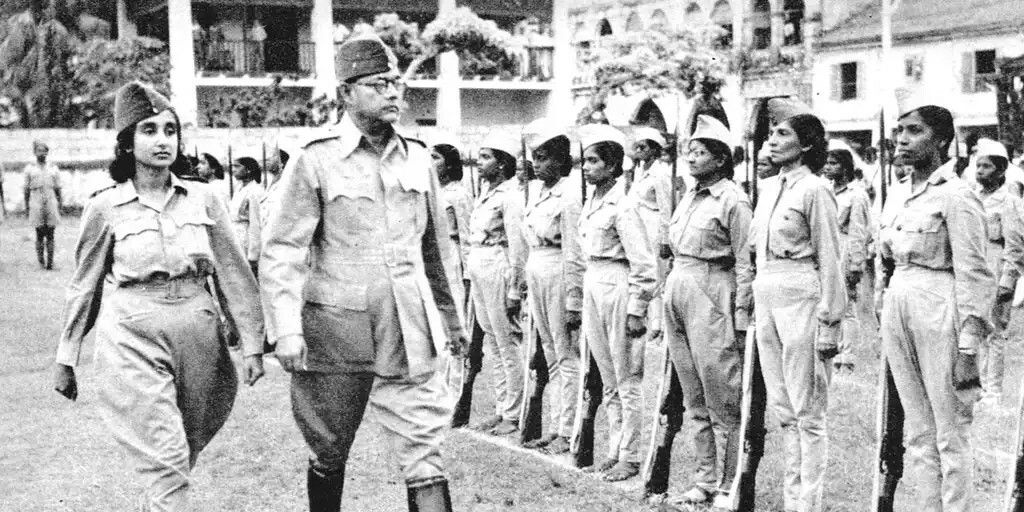If one were to mention the word captain or narrate a story of brave soldier who served the Indian National Army (INA) during the freedom struggle, the image of a macho, well-built man would be the first image that would come to our minds. In actuality, it was actually a diminutive, South Indian woman from an orthodox family, who would go on to be known in history as ‘Captain’ Lakshmi Sehgal.
Childhood and beyond
Lakshmi was born in erstwhile Madras Presidency in an orthodox South Indian family to Swaminadhan, a decorate lawyer and Ammukutty, a freedom fighter who would later on become a member of Constituent Assembly of India. She was a rebel even when she was young when stood up to her grandmother’s discriminatory practices towards Dalits. As her mother was involved in the freedom struggle, the seeds of nationalism and service towards the nation were sown inside Lakshmi in her formative years. She had also noticed how the fight for freedom was coupled with the struggle for social reform against child marriage and untouchability.
In an era where it was a rarity for women to even graduate from high school, Sehgal joined the Madras Medical College in 1938, where she took her MBBS. Her encounters with Suhasini Nambiar, who was Sarojini Naidu’s sister and a radical who had spent many years in Germany, as well as the book Red Star over China by Edgar Snow gave her a profound exposure about communism. One could say that this acted as a gentle nudge that would later push her to join the INA.
Lakshmi to Captain Lakshmi Sehgal
Sehgal had met with Subhash Chandra Bose at the age of 26 in Singapore, when she had gone to practice medicine as a young doctor. Little did she know that the meeting was going to change her life forever.
In an interview by Lakshmi at a later stage, she was quoted saying: “In Singapore, there were a lot of nationalist Indians like K. P. Kesava Menon, S. C. Guha, N. Raghavan, and others, who formed a Council of Action. The Japanese, however, would not give any firm commitment to the Indian National Army, nor would they say how the movement was to be expanded, how they would go into Burma, or how the fighting would take place. People naturally got fed up.”
It was only when Bose had entered the picture that the paradigm shifted. She had met with Subhash Chandra Bose upon learning that he was keen on recruiting women. In the meeting, she pushed for and ended up with a mandate to set up a women’s regiment, which was to be called the Rani of Jhansi regiment. There was a tremendous response from women to join the all-women brigade. This would mark a moment in history, the moment when Dr. Lakshmi became Captain Lakshmi Swaminadhan.
INA days
Lakshmi with her regiment marched to Burma in December 1944, and the decision to retreat was taken by the INA leadership by March 1945, before they entered Imphal. Lakshmi was arrested and kept under house arrest in the jungles of Burma. She came to India in 1946 when the INA trials were going on and the entire nation saw struggles against the colonial forces intensifying.
Lakshmi later married Col. Prem Kumar Sehgal who was also with her in the INA. Following her marriage, she moved to Kanpur, where she resumed her medical practice to help the refugees during the Partition.
Activist Lakshmi
In post-Independence India, she spent her life as a member of the Communist Party of India (Marxist) and the All India Democratic Women’s Association (AIDWA), championing the movement against socio-economic inequalities. Notably, she had joined the CPI(M) after her daughter, Subhashini, who was already a member, had appealed her to help out with the medical camps for Bangladeshi refugees. Lakshmi was quoted saying that joining the CPI (M) felt “like coming home”, since she had already had strong influences in the ideology from childhood.
She founded the AIDWA and led many of its activities and campaigns, including the relief measures after the Bhopal Gas Tragedy and the Anti-Sikh riots post Indira Gandhi’s assassination.
Political stint
She stood for the presidential elections against Dr. APJ Abdul Kalam in 2002, which the latter won hands down. During one of the campaigns, the diminutive doctor went on to say on camera in her unadorned and direct manner: “Freedom comes in three forms. The first is political emancipation from the conqueror, the second is economic [emancipation] and the third is social… India has only achieved the first.”
Captain Lakshmi Sehgal passed away in 2012, having led a full life, as an advocate against discrimination and as a champion of rights for the voiceless. Her struggles were one of the profound ones that shaped the position of women in politics in the 20th and 21st centuries.

